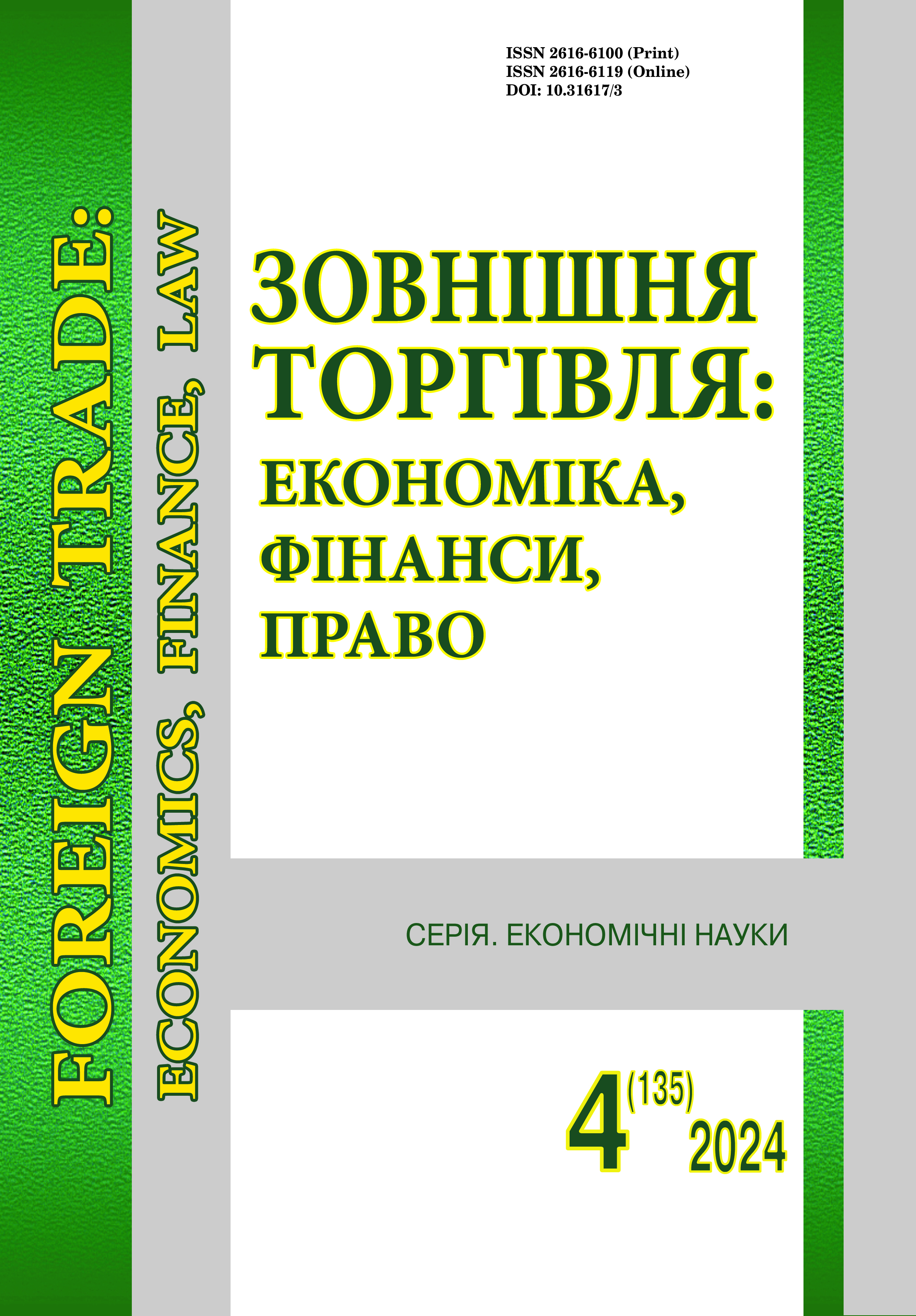Adaptation of European energy systems to the escalation of the geopolitical crisis
DOI:
https://doi.org/10.31617/3.2024(135)01Keywords:
energy, European energy market, energy security, "green transition", energy policy of Europe.Abstract
The relevance of the research topic is related to the current geopolitical, economic, technological and environmental challenges that have a significant impact on the state of energy markets in Europe. The key tasks of the energy policy of European countries are strengthening the energy security of the region, promoting the development of renewable energy markets, energy integration of the sector and the development of new energy-efficient solutions in the industry. Due to the direct influence of the general trends and priorities of European energy development on the domestic energy sector, the study of these trends is of great importance for Ukraine. The aim of the article is to identify trends and establish regularities in the development of energy markets in Europe in the context of modern geopolitical challenges and the energy transition. The research is based on the hypothesis of a change in the trajectory of the energy policy of European countries in the direction of solving the challenges that arise in the conditions of the geopolitical crisis, climate change and the increase in energy prices. The research was conducted using the methods of comparative analysis, structural-logical, generalization, statistical data processing, graphical and tabular data visualization. The current state, structure, and dynamics of the European energy market were analysed in the context of transformations that occurred as a result of geopolitical tension, inflationary pressure, threats to energy security, improvement of energy-efficient technologies, and EU obligations to reduce greenhouse gas emissions. Attention is focused on supplying the European market with gas, diversifying its supplies, reorienting electricity production from clean sources, production and use of fossil fuels in Europe, and increasing investments in renewable energy sources. European energy markets are dominated by trends associated with changes in energy suppliers and diversification of their sources; intensifying investment in solar, wind and hydropower and abandoning the use of coal; increasing investments in energy-efficient technologies; accelerating the construction of infrastructure for LNG; creation of a single energy market to ensure the free flow of energy between member countries; the development of energy storage technologies and production, storage and use of hydrogen as an alternative energy source; active use of smart technologies (smart meters and other devices for monitoring and optimizing energy consumption).
References
Antenucci, A., Granado, P., Gjorgiev, B., & Sansavini, J. (2019). Can models for long-term decarbonization policies guarantee security of power supply? A perspective from gas and power sector coupling. https://doi.org/10.1016/j.esr.2019.100410 DOI: https://doi.org/10.1016/j.esr.2019.100410
Energy Institute. (2023). The Statistical Review of World Energy, 2023. energyinst.org/statistical-review Enerdata. (2024, May 30). EU natural gas demand declines for two consecutive years (-7.4% in 2023). https://www.enerdata.net/publications/daily-energy-news/eu-natural-gas-demand-declines-two-consecutive-years-74-2023.html
ENTSO-G Transparency Platform. (n. d.). https://transparency.entsog.eu/#/map
EU coal regions in transition. (n. d.). https://energy.ec.europa.eu/topics/carbon-management-and-fossil-fuels/eu-coal-regions-transition_en#initiative-for-coal-regions-in-transition
European Commission. (n. d.). Market analysis. The Commission produces quarterly reports on EU gas and electricity markets. https://energy.ec.europa.eu/data-and-analysis/market-analysis_en
Eurostat. (2024). https://ec.europa.eu/eurostat/web/interactive-publications/energy-2024
Kapetaki, Z. (et al.). (2021). Recent trends in EU coal, peat and oil shale regions, EUR 30618 EN, Publications Office of the European Union, Luxembourg. https://doi.org/10.2760/510714
Rabbi, M. F., Popp, J., Máté, D., & Kovács, S. (2022). Energy Security and Energy Transition to Achieve Carbon Neutrality. https://doi.org/10.3390/en15218126 DOI: https://doi.org/10.3390/en15218126
Reuters. (2024, 14 February). Cyprus could produce first natural gas as soon as 2026. https://www.reuters.com/business/energy/cyprus-could-produce-first-natural-gas-soon-2026-minister-says-2024-02-14
Tian, Jinfang, Yu, Longguang, Xue, Rui, Zhuang, Shan & Shan, Yuli (2022). Global low-carbon energy transition in the post-COVID-19 era. https://doi.org/10.1016/j.apenergy.2021.118205 DOI: https://doi.org/10.1016/j.apenergy.2021.118205
World Energy Statistics and Balances. (2024). https://www.iea.org/data-and-statistics/data-product/world-energy-statistics-and-balances
Vovk, V., & Krasnoselska, А. (2023). Ecological and economic aspects of the transformation of Ukraineʼs energy supply in the conditions of war and post-war recovery. Economy and society, (56). https://doi.org/10.32782/2524-0072/2023-56-82 DOI: https://doi.org/10.32782/2524-0072/2023-56-82
Doronina, І. І. (2019). Transformation of the energy sector of the EU and Ukraine: renewable energy sources. Scientific notes of the Institute of Legislation of the Verkhovna Rada of Ukraine, (4). 122-129. http://nbuv.gov.ua/UJRN/Nzizvru_2019_4_14; https://doi.org/10.32886/instzak.2019.04.12 DOI: https://doi.org/10.32886/instzak.2019.04.12
Kogut, S. (2023). Modern trends in the development of global energy and energy security of Ukraine. https://doi.org/10.31891/mdes/2023-10-10 DOI: https://doi.org/10.31891/mdes/2023-10-10
Kogut-Ferens, O. I. (2022). The current state of development and functioning of the world energy market and trade in energy resources. http://dx.doi.org/10.5281/zenodo.7057495
Kudyrko, L., Korogod, А., & Buonokore, M. N. (2022). Renewable energy of the EU countries in the context of the risks of import dependence. Foreign trade: economy, finance, law, 123 (4), 17-28. https://doi.org/10.31617/3.2022(123)02 DOI: https://doi.org/10.31617/3.2022(123)02
Myltseva, V. (2023). The main trends of green energy in 2023: EU focus and challenges for Ukraine. https://www.juscutum.com/news/osnovni-trendi-zelenoyi-energetiki-2023-roku-fokus-ies-ta-vikliki-dlya-ukrayini
Nikolaienko, V. (2024). Development trends of the global energy system. https://getmarket.com.ua/ua/post/trendi-rozvitku-global-noyi-energosistemi
Plakhotniuk, N. V., Ikonnikova, N. V. (2018). European energy market and prospects of Ukraine. https://sls-journal.com.ua/web/uploads/pdf/S&LS_2018_Vol.%201,%20No.%201_128-134.pdf
Additional Files
Published
How to Cite
Issue
Section
License

This work is licensed under a Creative Commons Attribution 4.0 International License.
This work is licensed under a Creative Commons Attribution 4.0 International (CC BY 4.0)







